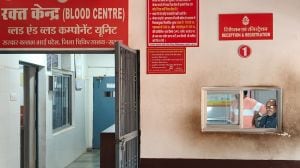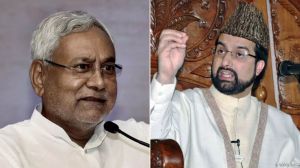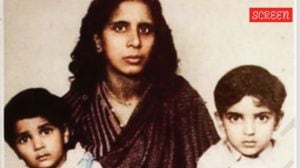AS THE BJP looks headed for a historic third win in Haryana, it will just be the boost the party needed after finishing short of a majority in the Lok Sabha polls – and ahead of the coming Assembly elections.

In both Haryana and J&K, the party’s direct opponent was the Congress, and the BJP ending up on top means it retains its edge in national politics – the INDIA bloc’s post-Lok Sabha poll enthusiasm notwithstanding.
Facing huge anti-incumbency in Haryana, farmer and wrestler anger over long-lasting protests and discontent over the Agniveer scheme, the BJP spread out its bets in the state. While Prime Minister Narendra Modi pitched in with big rallies, though he addressed just four against 10 in 2019, there was equal emphasis on local leaders and the consolidation of anti-Jat votes.
The Congress’s overarching emphasis on Jat vote appears to have rallied the other communities against the party. Even the Dalit vote, which the Congress had been banking on after its success in wooing them in the Lok Sabha polls, appears to have not deserted the BJP completely.
The campaign narrative was around Chief Minister Nayab Singh Saini, with the BJP banking on the fact that he had been in power for less than six months, and thus could dodge the 10-year hangover of party rule. After dropping many senior leaders for new faces, a strategy that seems to have clicked against the Congress move of repeating all its sitting MLAs, the BJP weaved its narrative around what the Saini government had done in terms of jobs and the backward classes, by raising the annual income limit of creamy layer for employment in the OBC category from Rs 6 lakh to Rs 8 lakh.
One of the highlights of the BJP campaign was the promise of “bina parchi, bina kharchi naukri”, the allegation being that under the Congress two terms led by Bhupinder Singh Hooda, jobs could not be had without recommendations or bribes.
Story continues below this ad
BJP leaders said that the party’s core group ensured that the concerns of “almost every leader who matters on the ground” were taken care of. “The interests and demands of most of the senior leaders were accommodated. The concerns of all those unhappy leaders which were seen as the reason for the party’s less than expected performance in the Lok Sabha elections were taken seriously,” said a party source.
The BJP had come down to five this time from all 10 seats in the 2019 Lok Sabha elections, and the results were followed by a spate of resignations and open rebellion by some leaders.
The BJP core team for Haryana included Union minister Dharmendra Pradhan, the Haryana election in-charge; Biplab Kumar Deb, co-in charge; Satish Poonia, BJP state in charge; CM Sahni; former CM Manohar Lal Khattar; Haryana party chief Mohan Lal Badoli; and Haryana BJP organisation in-charge Faninder Nath Mishra.
The party source said that the group had the backing of the top leadership. “These leaders decided the candidates but the final call was taken by Union Home Minister Amit Shah and BJP president J P Nadda.”
Story continues below this ad
A decisive BJP win will also silence the naysayers who have been talking of a rift with the RSS hurting the party. In Haryana, the RSS was believed to have taken a backseat to the BJP’s own robust organisation.
The BJP can expect the Haryana results to rub off in neighbouring Delhi, which is headed for elections within months. The party has not won the national capital now for more than 25 years.
A win in Haryana will also give the BJP bargaining weight in Maharashtra, where it is caught in a bitter seat tussle with allies, as well as Jharkhand, where the party has already mounted a full-scale offensive.
Besides, the BJP’s performance in both Haryana and J&K is a reality check for the Congress’s vaulting ambitions. The Congress’s allies in both Maharashtra and Jharkhand are now expected to drive a hard bargain.

































